Overview
Finding reliable vinyl floor installers in your area requires a careful evaluation of their qualifications. Start by:
- Requesting detailed quotes
- Checking references and reviews
- Confirming licensing and certifications
Confirming licensing and certifications is essential; it not only ensures compliance but also builds trust.
Next, compare pricing and services to understand the market landscape, and assess the quality of past work to gauge expertise.
By following these steps, you can select a qualified professional who aligns with your flooring needs, ultimately leading to a successful installation.
Introduction
Navigating the world of vinyl flooring can indeed be overwhelming. With a multitude of options available and the critical importance of selecting the right installer, homeowners are faced with a daunting task. As they seek to enhance their spaces with durable and stylish flooring, the demand for reliable vinyl floor installers becomes paramount.
But how can one ensure the selection of a professional who not only comprehends the intricacies of vinyl flooring but also delivers exceptional workmanship? This guide outlines essential steps for identifying trustworthy installers:
- Understand flooring options
- Evaluate qualifications
- Secure post-installation support
Understand Your Vinyl Flooring Options
Before you start your search for flooring professionals, it's essential to understand the different types of resilient flooring available. The primary options include:
- Vinyl Plank Flooring: This option mimics the appearance of hardwood and comes in a variety of styles and colors. Its durability and water resistance make it an excellent choice for high-traffic areas.
- Vinyl Tile Flooring: Resembling ceramic or stone tiles, vinyl tile is commonly used in kitchens and bathrooms due to its moisture resistance.
- Sheet Vinyl Flooring: Available in large rolls, this type is perfect for covering expansive areas without seams, providing a robust waterproof barrier.
By exploring these choices, you will be better equipped to determine which type aligns with your space and lifestyle, thereby enhancing your discussions with vinyl floor installers near me.
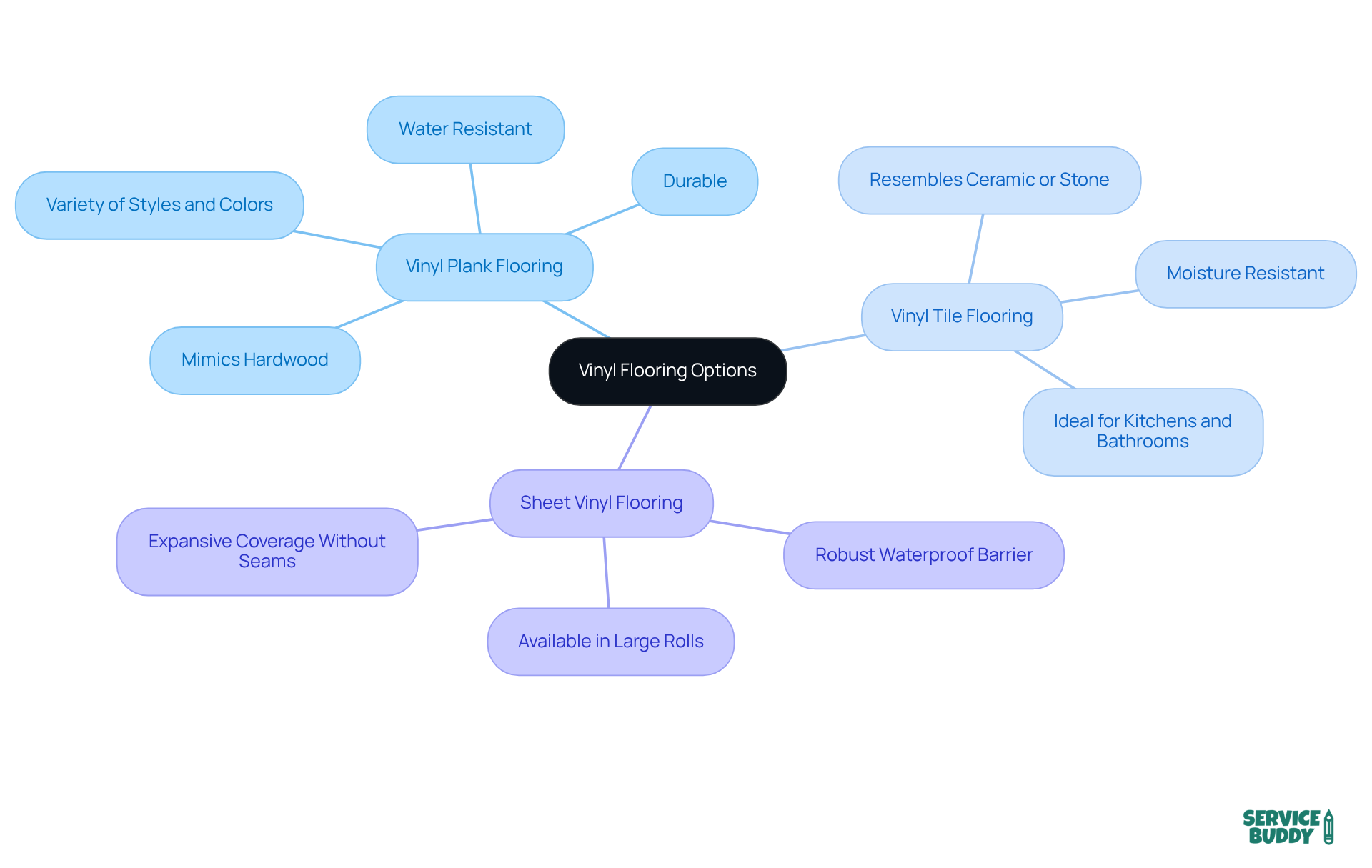
Evaluate Installer Qualifications and Experience
When searching for vinyl floor installers, evaluating the following qualifications is essential to ensure a successful project:
- Licensing and Insurance: Confirm that the technician holds a valid license to operate in your area and carries liability insurance. This protects you against potential accidents and ensures compliance with local regulations. Licensed contractors are accountable to regulatory boards, providing peace of mind regarding their expertise and adherence to safety standards. Claims of licensure should be confirmed through state licensing boards' online databases to ensure legitimacy.
- Certifications: Seek professionals , such as the National Wood Flooring Association (NWFA) or the Certified Flooring Experts (CFI). Certification indicates that the installer has undergone rigorous training and possesses the necessary skills to deliver high-quality work. Certified professionals are more likely to finish projects on schedule and with fewer mistakes, significantly lowering the risk of expensive repairs later. Additionally, hiring vinyl floor installers near me often comes with better warranty protection and can save you money in the long run.
- Experience: Ask about their particular background with synthetic surface installations. An experienced installer will understand the nuances of various vinyl products and installation techniques, ensuring that your flooring is installed correctly and efficiently. This expertise is crucial for meeting both aesthetic and functional requirements. Certified professionals are also more likely to complete projects on time and with fewer errors, further emphasizing the importance of their experience.
- Portfolio: Request to view examples of their previous work. A strong portfolio showcases the quality and style of their installations, allowing you to assess whether their work aligns with your vision. Successful projects finished by certified professionals often demonstrate their dedication to excellence and customer satisfaction, offering further assurance of their capabilities.
- Red Flags: Be aware of warning signs of untrustworthy contractors, such as missing current certifications, reluctance to discuss their training, or failure to provide clear answers about their qualifications. These red flags can help you avoid potential issues down the line.
By thoroughly assessing these factors, you can refine your choices to vinyl floor installers near me who are more likely to meet your expectations and provide a solution that enhances your space.
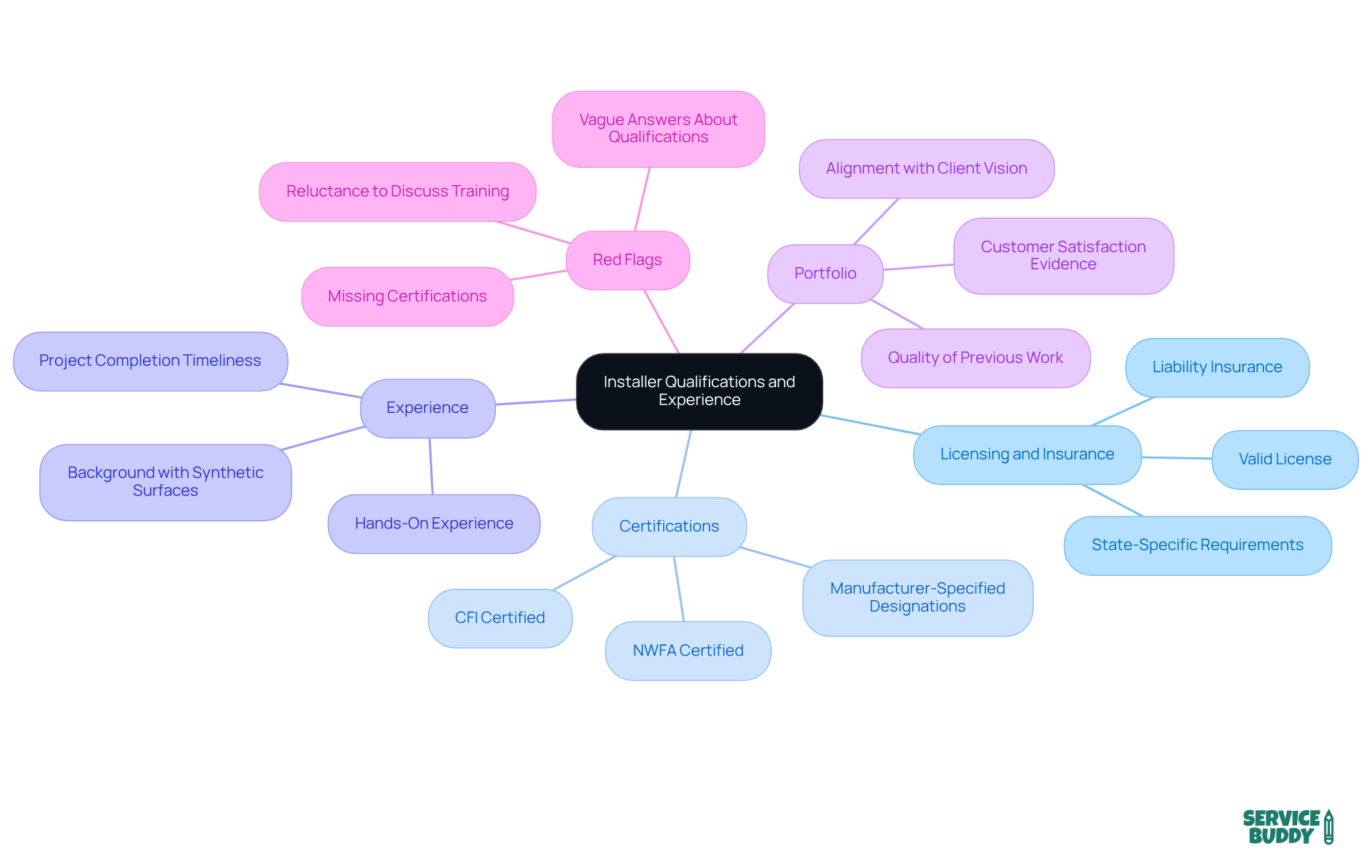
Request Quotes and Compare Pricing
To obtain accurate quotes for your vinyl flooring installation, follow these essential steps:
- Contact multiple vinyl floor installers near me: Reach out to at least three different installers to gather a variety of quotes. This approach not only provides a range of prices but also allows you to assess different service offerings.
- Provide Detailed Information: When requesting quotes, be specific about your project. Include details such as the kind of plastic material, the dimensions of the area (e.g., an average kitchen is typically 100-200 sq. ft.), and any unique requirements you may have.
- Ask for Itemized Quotes: Request detailed estimates that clearly outline the costs associated with materials, labor, and any additional charges, such as the removal of old surfaces, which can range from $0.50 to $2 per square foot. This transparency helps you understand where your money is going and ensures you are aware of any .
- Compare Services: Evaluate more than just the price; consider the services included in each quote. Look for warranties, estimated timelines, and the level of customer support offered. Reliable contractors typically provide clear project timelines and comprehensive service details.
Additionally, be mindful of budgeting for potential extra costs, such as subfloor repairs, which can significantly impact your overall expenses. By carefully analyzing these estimates, you can make a knowledgeable choice about which vinyl floor installers near me provide the best value for your flooring project.
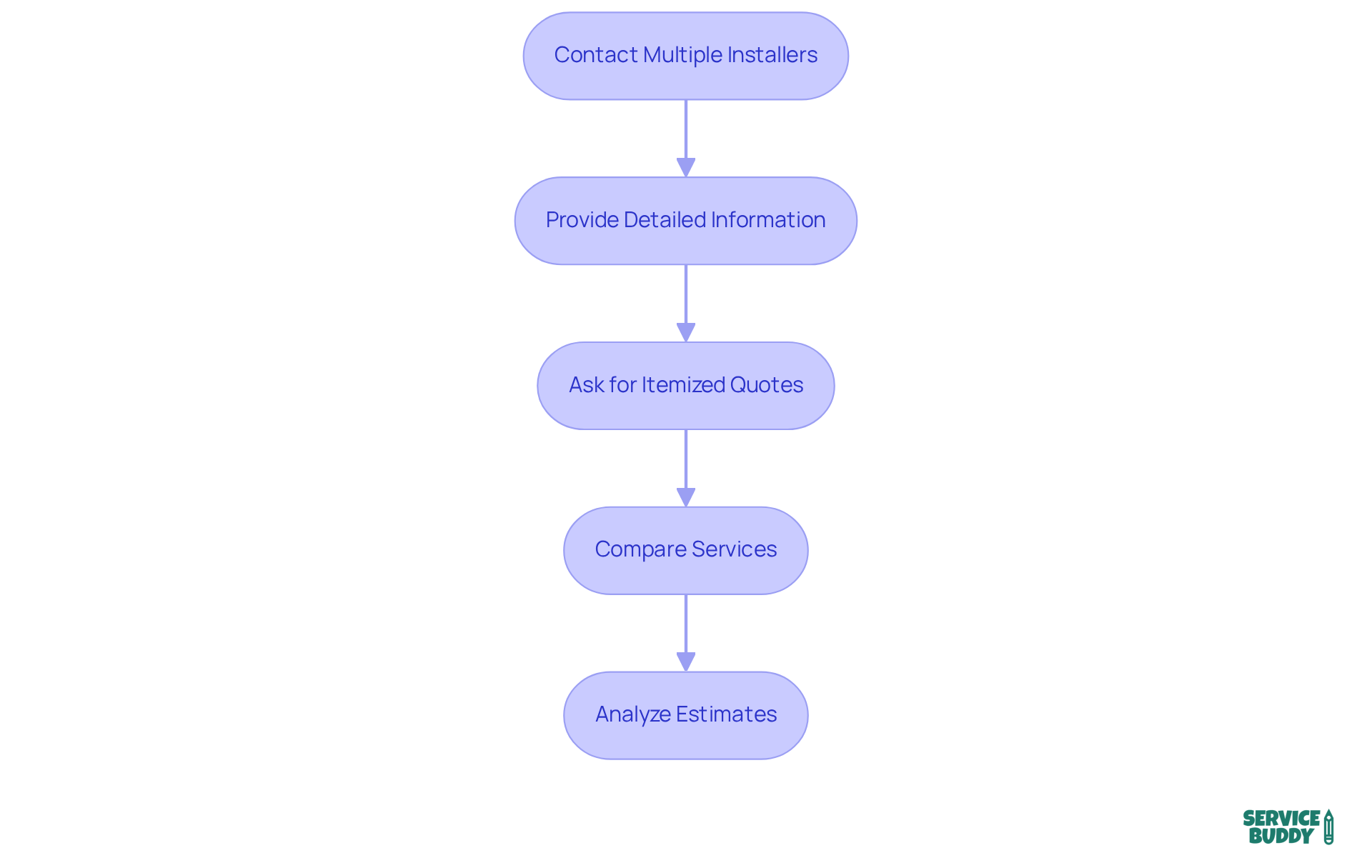
Check References and Read Reviews
To ensure you choose a reliable vinyl floor installer, follow these essential steps:
- Ask for References: Request at least three referrals from the technician. Reach out to these clients to inquire about their experiences, the quality of work, and whether they would recommend the contractor.
- Read Online Reviews: Utilize platforms like Google, Yelp, or Angie's List to check evaluations of the service provider. With before making a purchase, this step is crucial. Pay attention to both positive and negative feedback to gain a balanced perspective. As noted by industry experts, "Statistics only matter if you can translate them into smarter strategies," highlighting the importance of understanding consumer behavior in the flooring market.
- Look for Consistency: Identify patterns in the reviews. Consistent praise or complaints can reveal the technician's strengths or weaknesses, aiding your decision-making process. Remember, 57% of consumers will only consider businesses with 4+ stars, emphasizing the significance of positive online feedback in today's competitive market.
- Visit Completed Projects: If possible, visit some of the contractor's completed projects to evaluate the quality of their work firsthand. This provides valuable insight into their craftsmanship.
Furthermore, note that 78% of mobile local searches result in a purchase within 24 hours, underscoring the urgency for installers to maintain a strong online presence. By thoroughly checking references and reviews, you can gain confidence in your choice of vinyl floor installers near me.
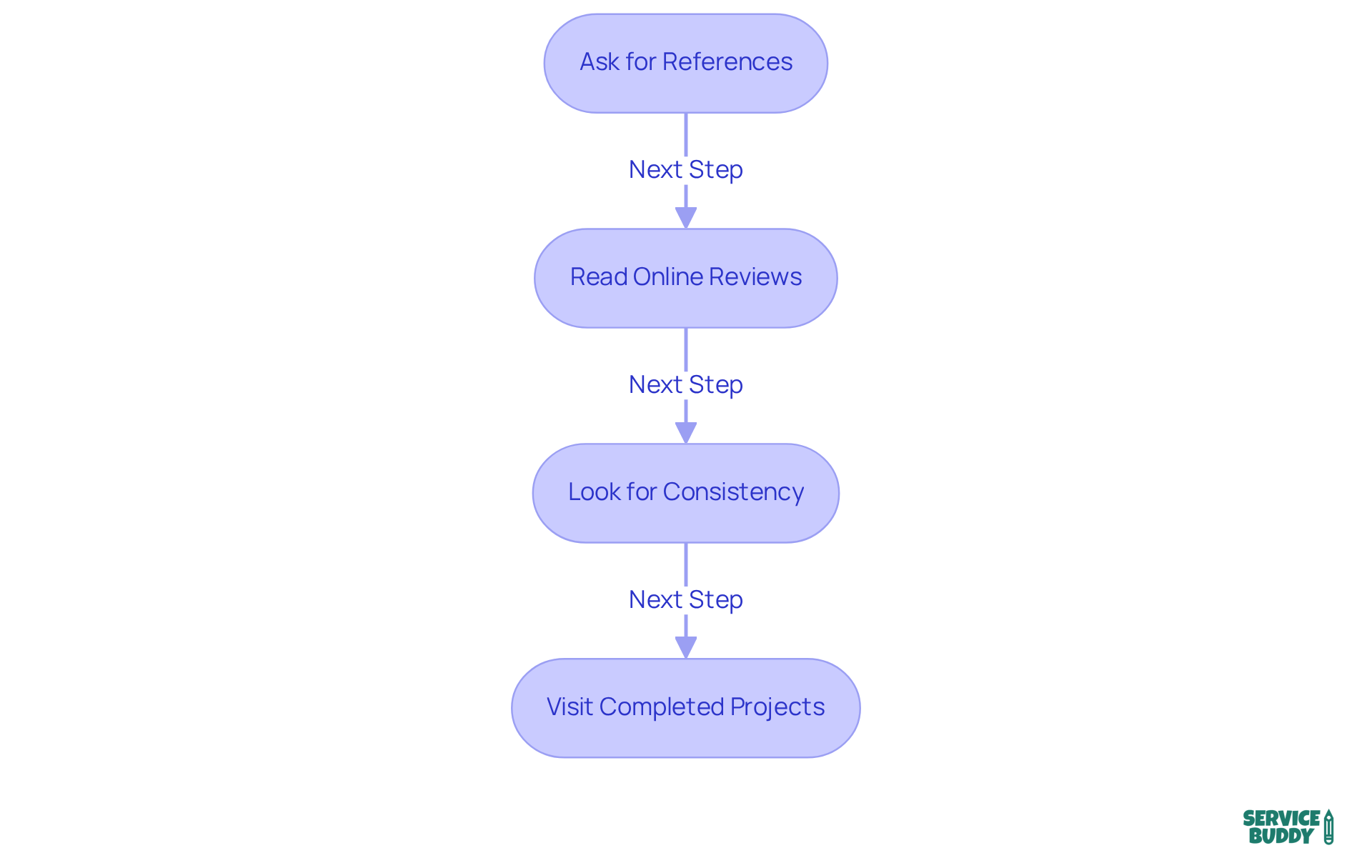
Discuss Warranties and Post-Installation Support
Before finalizing your decision, it is crucial to discuss the following critical aspects:
- Warranty Coverage: Inquire about the for both the product and the installation. Understanding what is covered—including defects, wear, and moisture damage—is essential, as these factors significantly impact the longevity of your surfaces.
- Duration of Warranties: Ask about the length of the warranties. Generally, a longer warranty period reflects greater confidence in the quality of both the product and the installation, providing you with peace of mind.
- Post-Installation Support: Clarify the type of support available after installation. Will the installer be accessible for questions or concerns? Comprehending the procedure for addressing any problems that could arise is vital for preserving the state of your surfaces. Many installers offer a follow-up service within the first few months to ensure everything is satisfactory.
- Documentation: Ensure that all warranty information is documented and provided to you in writing. This documentation is vital for making future claims and understanding your rights as a consumer.
- Statistics and Quotes: According to industry statistics, 75% of homeowners report higher satisfaction when post-installation support is readily available. As noted by professionals in the field, "Having a dependable installer who offers continuous assistance can significantly impact the upkeep of your surfaces and your tranquility."
By addressing these points, you can secure the necessary protection and support for your new vinyl flooring, ensuring a smooth experience with vinyl floor installers near me and achieving long-term satisfaction.
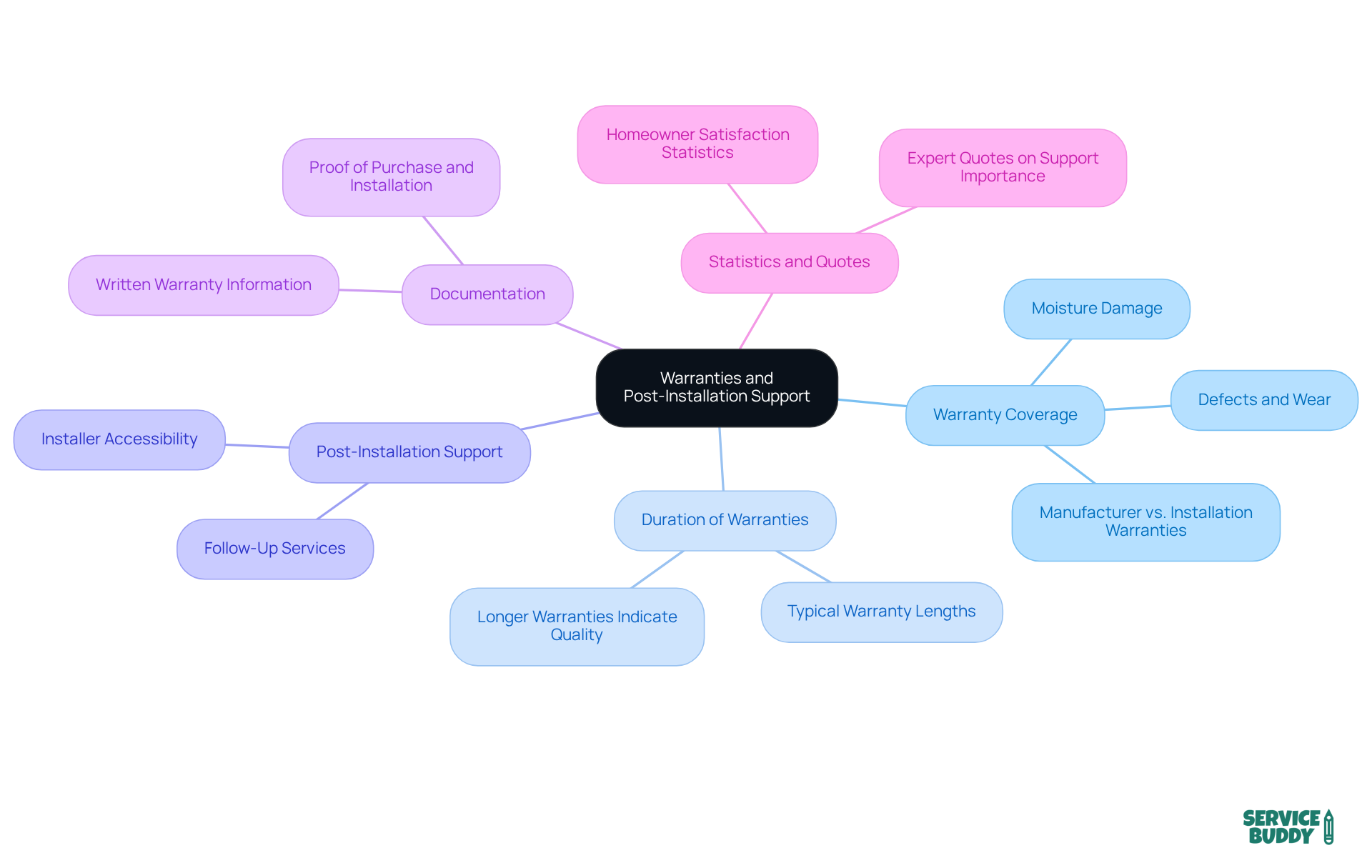
Conclusion
Finding reliable vinyl floor installers is crucial for executing your flooring project with precision and care. By understanding your vinyl flooring options and diligently evaluating potential installers, you lay the groundwork for an installation that fulfills both aesthetic and functional needs.
This guide outlines essential steps, including:
- Assessing installer qualifications
- Comparing pricing
- Checking references
- Discussing warranties
Each component is vital for making an informed decision. Confirming licenses and certifications, gathering multiple quotes, and reading online reviews empower homeowners to select professionals who are not only skilled but also trustworthy.
The significance of thorough research and due diligence cannot be overstated. Engaging with qualified vinyl floor installers ensures a seamless installation process and enhances the longevity of your flooring investment. By following these steps, homeowners can enjoy peace of mind, knowing they have made a well-informed choice for their vinyl flooring needs.
Frequently Asked Questions
What are the different types of vinyl flooring available?
The primary options for vinyl flooring include Vinyl Plank Flooring, which mimics hardwood; Vinyl Tile Flooring, resembling ceramic or stone tiles; and Sheet Vinyl Flooring, available in large rolls for covering expansive areas without seams.
What are the benefits of Vinyl Plank Flooring?
Vinyl Plank Flooring is durable, water-resistant, and available in various styles and colors, making it an excellent choice for high-traffic areas.
Why is Vinyl Tile Flooring commonly used in kitchens and bathrooms?
Vinyl Tile Flooring is commonly used in kitchens and bathrooms due to its moisture resistance, which makes it suitable for these areas.
What is the advantage of using Sheet Vinyl Flooring?
Sheet Vinyl Flooring provides a robust waterproof barrier and is ideal for covering large areas without seams, which enhances its durability.
What qualifications should I look for in vinyl floor installers?
When evaluating vinyl floor installers, look for valid licensing and insurance, certifications from reputable organizations, relevant experience, a strong portfolio of previous work, and be aware of any red flags indicating untrustworthiness.
Why is it important to confirm an installer’s licensing and insurance?
Confirming an installer’s licensing and insurance protects you against potential accidents and ensures compliance with local regulations, providing peace of mind regarding their expertise and safety standards.
What do certifications from organizations like the NWFA or CFI indicate?
Certifications indicate that the installer has undergone rigorous training and possesses the necessary skills to deliver high-quality work, reducing the risk of mistakes and ensuring projects are completed on time.
How can I assess an installer’s experience?
You can assess an installer’s experience by asking about their background with synthetic surface installations and understanding their familiarity with various vinyl products and installation techniques.
Why is it beneficial to view an installer’s portfolio?
Viewing an installer’s portfolio allows you to assess the quality and style of their previous work, ensuring their capabilities align with your vision for your flooring project.
What are some red flags to watch out for when hiring vinyl floor installers?
Red flags include missing current certifications, reluctance to discuss training, and failure to provide clear answers about their qualifications, which may indicate untrustworthiness.




